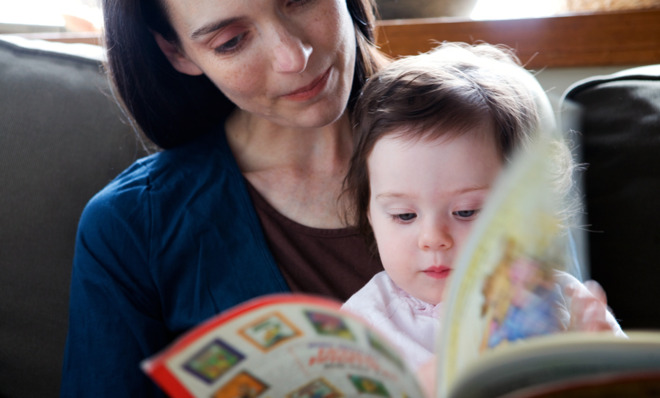11 lessons every good parent should teach their kid
Respect is the root of all good things


A free daily email with the biggest news stories of the day – and the best features from TheWeek.com
You are now subscribed
Your newsletter sign-up was successful
We all want to think we're raising up good kids. That we're teaching them the behavior and the thought processes they need to flourish. But sometimes people that work with our kids in professional or leadership roles have a clearer perception of what our kids are actually learning, and more important, what they're not. We asked people who work with kids, "If you could have parents instill one value in their child before they come to you, what would it be?" These are the answers.
1. Respect is the root of all good things
If there is basic human respect, so many other good character traits follow suit. Respect for authority also shows obedience. Respect for others covers kindness. Respect for oneself shows self-control and self-worth. Things like teasing and bullying happen in the absence of respect. Back talk, disobedience, laziness, same thing, they just don't exist where respect is found. Cleanliness, self-control, follow-through, and determination also are the product of respect. —Mr. & Mrs. W, boarding school dorm parents
2. Manners (or understand that other people are people)
The Week
Escape your echo chamber. Get the facts behind the news, plus analysis from multiple perspectives.

Sign up for The Week's Free Newsletters
From our morning news briefing to a weekly Good News Newsletter, get the best of The Week delivered directly to your inbox.
From our morning news briefing to a weekly Good News Newsletter, get the best of The Week delivered directly to your inbox.
I think manners are the most important thing for parents to teach their children: Manners raise a child's social IQ and flags them as a reasonable, thoughtful person. The simple act of consideration that the person you are speaking to is (1) a person, and (2) not aware of all your thoughts and needs automatically. —Rebecca Mayer, youth services librarian
3. To lose (and win) gracefully
I've noticed that children who play games with their family and have a healthy experience with winning and losing at home seem to be better sports in general at school. Most of my students come to school and just have no idea how to lose or even win gracefully. It's probably okay to let your child win every now and then, but please never do it just because they are being a sore loser. I think it would be better to just stop playing until they are a better sport. —Lyndsey Z., kindergarten teacher
4. Show up and work
I wish people would tell their children that showing up on time and doing all the work is 90 percent of life. A bonus would be if they told their children to take advantage of office hours. I could really help kids if they would come ask me questions." —Maren Bradley Anderson, associate professor, Western Oregon University
5. Quality person trumps quality performance
Self-respect and respect for others are the foundation on which quality people are built. I'd rather coach a respectful kid 100 times more than a d-----bag natural athlete. —Mignon H, coach
6. Tolerance snuffs out anger
A free daily email with the biggest news stories of the day – and the best features from TheWeek.com
As a camp counselor, I wish parents taught tolerance of everything: Religions, sexual orientation, personalities, race, etc. We would have many less angry people in the world if they were more tolerant and open. —Joy Nelson, camp counselor
7. The ability to tell the truth, because it can stop a vicious spiral
I think if an individual cannot be honest, he or she will steal from others, lie (to get money or get out of trouble), cheat, give themselves permission to shoplift or take from others, develop an attitude of entitlement, etc. As a young adult or teenager, the behavior begins as stealing a candy bar, skipping school, lying to parents, curfew violations, attitude and drama, or continued negative peer associations. As life continues, their circumstances get worse. I think of it like weaving a web. —youth parole officer of 16 years, wishing to remain anonymous
8. Learn from everything
Take advantage of every opportunity you get, whether it's doing your homework, talking to a person, watching a demonstration, or listening to someone share their wisdom. You never know how much you can learn. —Kathy Conley, high school teacher
9. A lesson for parents: Welcome help
I wish parents would be more proactive in partnering with the church and school to help their child. Children are so different and unique, and so it's our job as pastors, teachers, and administrators in schools to help them be successful while creating plans that fit the child's needs and God's design for them. —Toakase Vunileva, principal and youth pastor, Mile High Adventist Academy
10. Mom and Dad won't always be there to save you when you screw up
I see a lot of young people getting into trouble because they come to the realization that they can do pretty much anything they want while avoiding the consequences, because their parents are always there to defend them and bail them out regardless of how egregious the situation. Failure to learn responsibility at an early age is the catalyst to poor or sometimes tragic results, whether it be teen pregnancy, addiction, the inability to secure and hold a job, poor academic achievement, or criminal conduct. —Rick J., criminal sergeant, Pendleton Police Department
11. Be kind to puppets
I wish parents would teach their kids to not attack puppets. I guess it is kind of a respect thing that runs deeper than how puppets are treated, but it manifests when kids come up and tear off a puppet's arm. Or punch them...in the middle of a show. —Benjamin W, children's pastor, puppeteer
Therese O'Neill lives in Oregon and writes for The Atlantic, Mental Floss, Jezebel, and more. She is the author of New York Times bestseller Unmentionable: The Victorian Ladies Guide to Sex, Marriage and Manners. Meet her at writerthereseoneill.com.
-
 How the FCC’s ‘equal time’ rule works
How the FCC’s ‘equal time’ rule worksIn the Spotlight The law is at the heart of the Colbert-CBS conflict
-
 What is the endgame in the DHS shutdown?
What is the endgame in the DHS shutdown?Today’s Big Question Democrats want to rein in ICE’s immigration crackdown
-
 ‘Poor time management isn’t just an inconvenience’
‘Poor time management isn’t just an inconvenience’Instant Opinion Opinion, comment and editorials of the day
